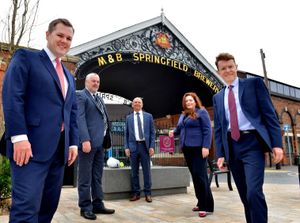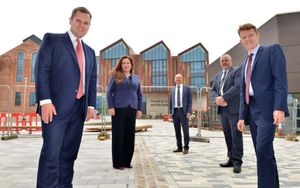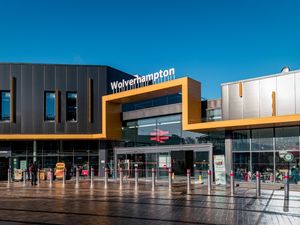Multi-million pound funding boost for Dudley light rail, Stafford Shire Hall, i54 and Wolverhampton University
More than £37 million of Government funding has been given to "shovel ready" projects in the Black Country and Staffordshire in a bid to boost the economy.

The money from the Government’s Getting Building Fund is aimed at projects which can be started quickly and completed within 18 months to aid economic recovery after the coronavirus lockdown.
Robert Jenrick, the secretary of state for housing, communities and local government, visited Wolverhampton on Tuesday to announce the Government's funding for the region.
Where the money is going:
£14.9m for the University of Wolverhampton's National Brownfield Institute at the new Springfield Campus
£12.4m for the Very Light Rail Innovation Centre in Dudley
£3m for the i54 Western Extension next to the M54 motorway in Wolverhampton
£2.89m for a Stafford project to provide advanced digital simulation and immersion suites that will enable healthcare professionals to explore and develop new techniques
£1.6m to repurpose Stafford's Shire Hall for entrepreneurialism and business start-ups
£1m towards West Midlands 5G's work with small and medium sized business to develop apps
£1.3m for improvements to Hoobrook Island in Kidderminster to address the long-standing congestion
£550,000 for the Cannock Chase Digital Skills Academy which will provide access to skills training in Cannock and Tamworth
£550,000 for the Wyre Forest Construction and Automotive Skills Centre at Kidderminster College
The projects receiving the most funding are the planned National Brownfield Institute at the University of Wolverhampton's Springfield Campus, which is getting £14.9m, and the Very Light Rail Innovation Centre in Dudley, which is receiving £12.4m.
The new £17.5m brownfield institute is planned to be the flagship of the £100m campus development at the former Springfield Brewery and will research and develop new construction methods and ways of regenerating contaminated land.
Meanwhile the Very Light Rail Innovation Centre will design and build lightweight rail vehicles and include 2km of test tracks from Castle hill to Cinder Bank.

Mr Jenrick, who was born in the city and went to Wolverhampton Grammar School, had a tour of the city's institute then spoke about the Black Country's future.
He said: "Wolverhampton as, across the whole of the Black Country, has always had a very strong focus on construction and engineering, that's the history of the area and it's also its future.
"This institute will help to research and train the next generation of construction workers and help us to deliver our ambitious housing targets.
"There's a whole range of projects which we're supporting today, they've been chosen by local people and the local business community through the LEP network as projects which are going to help create jobs, boost economic confidence, and which are shovel-ready, so these are projects where work can commence within weeks and they should be able to be completed within two years.
"From education, to economic infrastructure like units for small businesses to move into, transport projects, road, light rail, electric buses and many more.
Light rail back on track
Dudley Council leader Patrick Harley said he was "absolutely delighted" that the Very Light Rail is back on track.
He said: "I asked for this to be treated as the highest of priorities by the Government and they have come through for us.
"The Very Light Rail Test Track and National Innovation Centre is a key project for our borough.
"It will offer an innovative and exciting opportunity to provide lower cost local rail connectivity, encouraging shift from private vehicles towards public transport.
"It will put Dudley on the national map – and with the money in place, things will now start to move quickly to deliver it."
Wolverhampton 'on international map'
Councillor Ian Brookfield, leader of Wolverhampton Council, welcomed the funding for the university, saying: "It's going to put this site on the international map, it's of that much importance.
“The National Brownfield Institute will develop innovative methods and approaches to unlocking brownfield land and help us meet the demand to build more houses.
"This will help us save our green belt. I've seen the site over the months and it's absolutely fantastic, everyone who is using that site will be in a world-class facility.
"It will be part of a nationally and internationally significant centre of excellence for built environment technologies and will help the city and the region develop a global reputation in this field.”
The council is now working with the university on plans and final evaluations, with a view to works starting on site later this year. A request for the remainder of the funding required forms part of the city’s bid to the Government’s Towns Fund.
Stafford investment
Councillor Patrick Farrington, leader of Stafford Borough Council, said he hoped the news of the investment in Shire Hall would draw more people into the town.
He said: “The Shire Hall is an iconic building in the heart of Stafford and I am really pleased to hear it has been successful in obtaining this funding.
"There has been a great deal of interest from many people in our community about getting the building back open and throughout my time as leader I have always tried to put this as one of our priorities in our partnership working with the County Council. It will hopefully draw more people and business opportunities into our county town.
“It is great so see yet more significant investment in our borough.”
Andy Street, mayor of the West Midlands and chairman of the WMCA, added: “At a difficult time for the West Midlands’ economy brought on by the coronavirus pandemic, it is great to see the Government putting further cash on the table to help aid our recovery.
"I hope that people across the West Midlands will see this as part of the Government's commitment to getting the country going again, getting building, and creating and sustaining jobs where they're really needed."
The successful projects in England will receive a portion of the £900 million Getting Building Fund, announced by the Prime Minister in June, with the investment expected to deliver up to 45,000 homes, create up to 85,000 jobs and reduce around 65 million kgs of CO2 emissions across the country.





